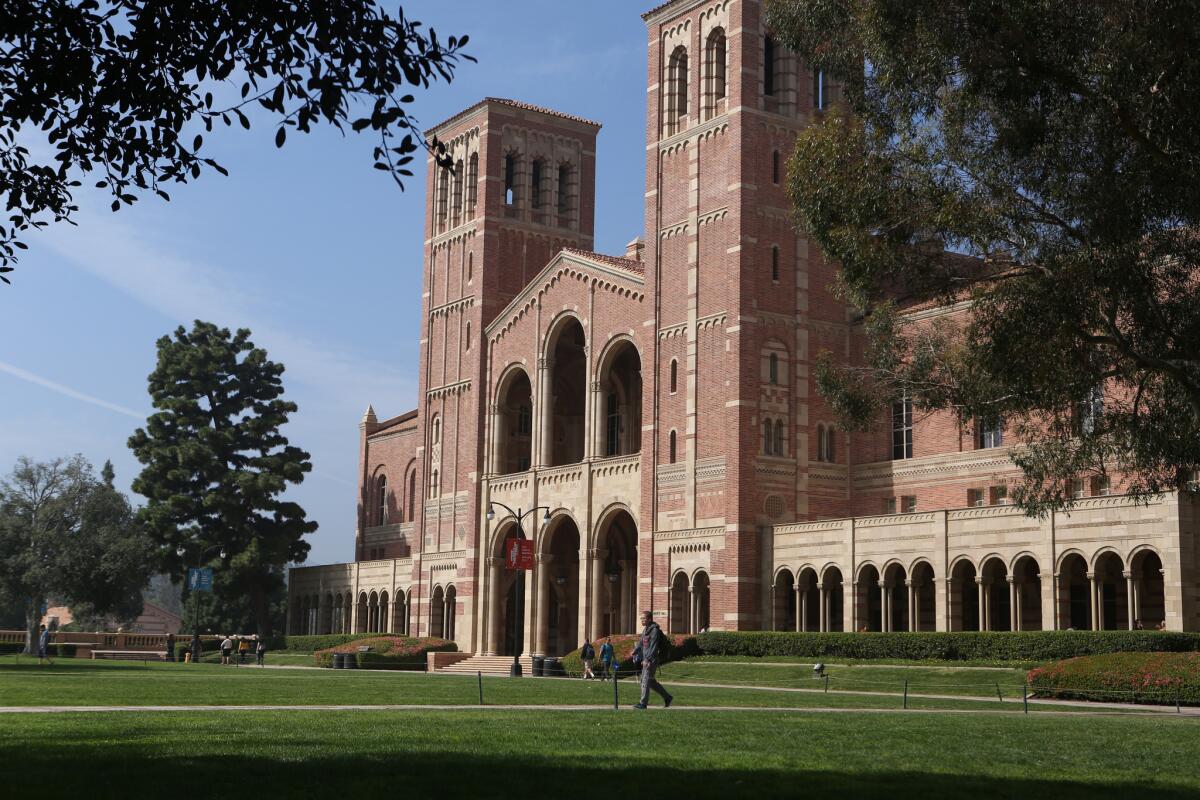UCLA will get hundreds of millions for rights to prostate cancer drug

UCLA’s sale of royalty rights for the prostate cancer drug Xtandi is the largest-ever technology transfer deal involving a University of California invention.
- Share via
A prostate cancer drug developed at UCLA will provide hundreds of millions of dollars for research under a record-setting deal announced Friday by university officials.
Royalty Pharma, a New York-based pharmaceutical investment company, paid $1.14 billion for royalty rights to the drug known as Xtandi. It was the largest-ever technology transfer deal involving a University of California invention.
------------
FOR THE RECORD
11:02 a.m.: A previous version of this article identified the firm involved in the deal as Royal Pharma and described it as a pharmaceutical company. The company’s name is Royalty Pharma, and it is a pharmaceutical investment company.
------------
UCLA pocketed $520 million of the proceeds for its 43.9% ownership stake in the drug. The funds will be placed in a portfolio that is expected to generate $60 million a year to fund campus research, scholarships for undergraduates and fellowships for graduate students. The annual haul will continue until 2027, when major patents on the drug expire.
The money will help UCLA offset declining federal dollars for basic research and diminished state support for general operations, campus officials said.
UCLA Chancellor Gene Block said the sale allows the university to serve one of its “essential missions — funding and generating research with practical applications that serve the public good.”
Prostate cancer is one of the most common cancers in America, affecting about one in seven men at some point in their lives. Last year, more than 220,000 new cases were diagnosed in the U.S., and about 27,540 men died of the disease, according to the American Cancer Society.
The work that led to Xtandi began in the early 2000s, when researchers pressed to understand why prostate cancer tumors sometimes continued to grow even when drugs were able to suppress testosterone, the hormone that fuels the malignant cells.
Xtandi, also known by the generic name enzalutamide, prevents testosterone from latching on to prostate cancer cells. With less fuel, the cancer cells can’t grow as well.
In clinical trials, men with metastatic prostate cancer who took the drug lived longer — and in some cases were able to delay chemotherapy treatments — compared to similar patients who took a placebo.
UCLA patented the key chemical compound and, in 2005, licensed it to Medivation Inc. of San Francisco. The company received FDA approval to market Xtandi as a prostate cancer medication in 2012 and reported $1.9 billion in worldwide sales of the drug in 2015.
Xtandi generated $33.3 million in royalties and other income for the University of California last year, more than any other UC-developed drug.
Still, experts from Westwood Technology Transfer, a not-for-profit advisory board launched by UCLA 18 months ago to help the university squeeze more value out of its patents, recommended the deal with Royal Pharma. Tom Unterman, the board’s chairman, noted that revenue could drop at any time if drug prices were to fall or better therapies become available.
“It was deemed prudent to [cash out] the royalty interests,” Unterman said. (Earlier in his career, Unterman served as chief financial officer for Times Mirror Co., The Times’ former owner.)
Join the conversation on Facebook >>
Xtandi is hardly the first blockbuster drug to emerge from research labs in Westwood.
UCLA pharmacologist Louis J. Ignarro’s studies of nitric oxide’s role in the body won him the Nobel Prize in medicine and led to the erectile dysfunction drug Viagra.
And Dr. Dennis Slamon spent years investigating the role of genetic mutations in breast cancer, resulting in the drug Herceptin, which targets a mutation seen in about one in four women with breast cancer.
UCLA never received royalty payments for either of these drugs. Westwood Technology Transfer aims to help UCLA structure its research programs so that opportunities like these aren’t overlooked again, Unterman said.
The research on Xtandi was led by chemist Michael Jung, who has been at UCLA since 1974, and Dr. Charles Sawyers, now at the Memorial Sloan Kettering Cancer Center in New York. The two men and six other researchers will share equally in the proceeds from their 37.5% stake in the drug’s royalty interest.
The remaining 19% was owned by the Howard Hughes Medical Institute, which helped fund Sawyers’ work.
Twitter: @TeresaWatanabe
ALSO
USC’s tuition will top $50,000 for the first time
How a security upgrade makes it harder to apply for financial aid this year
More to Read
Sign up for Essential California
The most important California stories and recommendations in your inbox every morning.
You may occasionally receive promotional content from the Los Angeles Times.











